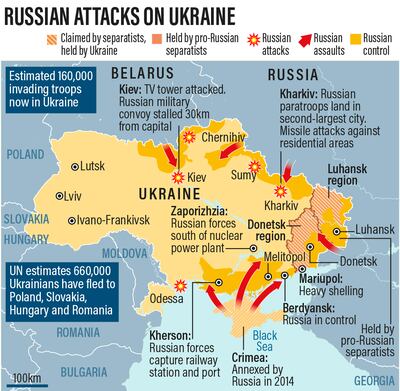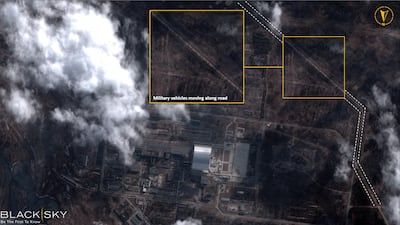The nuclear situation in Ukraine is “complex and difficult to grasp”, with some power plants falling under Russian control and storage facilities at risk of being hit, the head of the International Atomic Energy Agency has said.
Rafael Grossi briefed IAEA governors that Russia now controlled the territory around the operational Zaporizhzhya plant, including the village where most of its employees live, as well as the perimeter of the Chernobyl accident site.
However, although Russia physically controls those areas, Ukraine’s atomic energy agency is still operating the country’s four nuclear plants, Mr Grossi said.
Ukraine gets more than half its electricity from the 15 reactors at its four plants and the invasion has led to fears for nuclear safety. Radiation levels at Chernobyl appeared to spike after Russia took control of the area.
Mr Grossi sought to offer some reassurance on Wednesday by saying the plants were still running smoothly at present and that radiation at Chernobyl did not appear to be a hazard to the public.
But he raised concern that the strain of war could take its toll on staff and jeopardise the smooth running of the reactors, especially because some of the workers are thought to be confined to their plants and unable to go home.
“It is a humanitarian issue, but not only. It’s also a technical issue,” he told a press conference after the board of governors’ meeting.

Another concern is that radioactive waste could be released if storage sites are hit by Russian missiles.
Mr Grossi said he believed Moscow would not break international agreements not to target nuclear installations deliberately, but acknowledged there was a risk of an accidental strike.
Regulators have already reported two concerning incidents in which a waste disposal site was apparently hit by missiles and an electrical transformer at another such facility was damaged.
There was no sign of radioactive material being released but the two incidents “highlight the risk that facilities with radioactive material may suffer damage during the armed conflict, potentially with severe consequences” Mr Grossi said.
Ukraine has formally requested the IAEA’s assistance in safeguarding the Chernobyl plant, the site of the world's worst nuclear disaster in 1986 which is now surrounded by a 30-kilometre exclusion zone.
Military analysts said Russia might have taken over the area because of its position on the way from the border to Kyiv rather than because of any strategic value that Chernobyl had.
The IAEA is carrying out some remote monitoring of Ukrainian plants from its Vienna base, including checking seals, which indicates that the reactors are still operating normally.
However, negotiations are continuing with both Russia and Ukraine about possible physical inspections.
“The situation in Ukraine is of course complex and difficult to grasp,” said Mr Grossi, who said gaining access for inspectors in a war zone would be “extremely delicate”.
“We are trying to make sure that we will not have added suffering because of any radioactive release or anything having to do with nuclear facilities,” he said.


